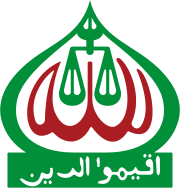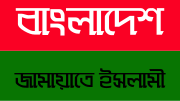Bangladesh Jamaat-e-Islami বাংলাদেশ জামায়াতে ইসলামী | |
|---|---|
 | |
| Abbreviation | Jamaat-e-Islami Jamaat JI |
| Ameer | Shafiqur Rahman |
| Secretary General | Mia Golam Parwar |
| Founder | Abbas Ali Khan |
| Founded | 1975[1] |
| Split from | Jamaat-e-Islami Pakistan[2] |
| Headquarters | Mogbazar, Dhaka, Bangladesh |
| Student wing | Bangladesh Islami Chhatra Shibir |
| Ideology | Islamism[3] Islamic fundamentalism[4] Pan-Islamism[5] Social conservatism Right-wing populism[6] Indoscepticism[7] |
| Political position | Far-right[8] |
| Religion | Islam[5] |
| International affiliation | Muslim Brotherhood[9] JI (Pakistan)[9] JI (India)[9] AKP (Turkey)[9] |
| Colors | Light green |
| MPs in the Jatiya Sangsad | Parliament dissolved |
| Mayors in the City Corporations | Post dissolved |
| Councillors in the City Corporations | 10 / 640 |
| Chairmans in the District Councils | 0 / 64 |
| Chairmans in the Subdistrict Councils | 0 / 495 |
| Chairmans in the Union Councils | 0 / 4,554 |
| Election symbol | |
 | |
| Party flag | |
 | |
| Website | |
| jamaat-e-islami.org | |
| Part of a series on Islamism |
|---|
|
|
| Part of a series on |
| Islam |
|---|
 |
Bangladesh Jamaat-e-Islami (Bengali: বাংলাদেশ জামায়াতে ইসলামী, lit. 'Bangladesh Islamic Party'), previously known as Jamaat-e-Islami Bangladesh,[10] is a major Islamist political party in Bangladesh.[a]
The party's origin can be traced back to the original Jamaat-e-Islami party founded by Abul A'la Maududi in 1941. Its predecessor, the Jamaat-e-Islami Pakistan, strongly opposed the independence of Bangladesh and break-up of Pakistan. In 1971, paramilitary forces associated with the party collaborated with the Pakistan Army in mass killings of Bangladeshi nationalists and pro-intellectuals.[b]
Upon the independence of Bangladesh in 1971, the new government banned Jamaat-e-Islami from political participation since the government was secular and some of its leaders went into exile in Pakistan. Following the assassination of the first president and the military coup in 1975, the ban on the Jamaat was lifted and the new party Jamaat-e-Islami Bangladesh was formed. Exiled leaders were allowed to return. Abbas Ali Khan was the acting Amir of Jamaat-e-Islami Bangladesh. In the 1980s, the Jamaat joined the multi-party alliance for the restoration of democracy. It later allied with Bangladesh Nationalist Party and Jamaat leaders became ministers in the two BNP-led governments of prime minister Begum Khaleda Zia (from 1991 to 1996 and from 2001 to 2006). Awami League also got involved with Jamaat to come to power in 1996.[21] In 2008, it won two of 300 elected seats in Parliament. In 2010 the government, led by the Awami League, began prosecution of war crimes committed during the 1971 war under the International Crimes Tribunal. By 2012, two leaders of the BNP, one leader from Jatiyo Party and eight of Jamaat had been charged with war crimes, and by March 2013, three Jamaat leaders had been convicted of crimes.[22] On 1 August 2013, the Bangladesh Supreme Court cancelled the registration of the Jamaat-e-Islami, ruling that the party is unfit to contest national elections.[c] With the surge of July Revolution, then Sheikh Hasina government banned the party fully on 1 August 2024.[27][28] However, after the fall of Sheikh Hasina, The decision was reversed on 28 August by the interim government.[29][30]
- ^ (in French) Jamaat-e-Islami Bangladesh ; Parti islamiste du Bangladesh (fondé en 1941) (interdit entre 1971 et 1978, puis en 2013 par la Cour suprême)
- ^ Haqqani, Husain (2005). Pakistan: Between Mosque and Military. Washington, D.C.: Carnegie Endowment for International Peace. p. 171. ISBN 978-0-87003-214-1.
- ^ Riaz, Ali (2008). Islamist Militancy in Bangladesh: A Complex Web. Routledge. pp. 16, 19. ISBN 978-0-415-45172-7.
- ^ "Jamiat Ulema-e-Islam (JUI) history". Islamopediaonline.org website. 1 January 2015. Archived from the original on 26 December 2017. Retrieved 3 March 2020.
- ^ a b Campo, Juan Eduardo (2009). Encyclopedia of Islam. Infobase Publishing. p. 390. ISBN 978-1-4381-2696-8.
- ^ "Mapping Global Populism - Panel #9: Civilizational Populism and Religious Authoritarianism in Bangladesh, Sri Lanka and the Maldives". European Center for Populism Studies. 16 January 2024.
- ^ "Bangladesh: The Wind in Jamaat-e-Islami's Sails is Worrying for India". www-thequint-com.org. 28 June 2023.
- ^ "A Islamist political party with no link to terrorism and militancy". The Hindu. 28 August 2024.
- ^ a b c d "জামায়াতে ইসলামীর বিদেশী বন্ধু কারা?" [Who are the foreign allies of Jamaat-e-Islami?]. BBC Bangla (in Bengali). 11 May 2016. Retrieved 1 September 2024.
- ^ Cite error: The named reference
Banglapediawas invoked but never defined (see the help page). - ^ "Bangladesh's election: The tenacity of hope". The Economist. 30 December 2008. Retrieved 26 January 2015.
[The BNP] seems also to have been hurt by its alliance with Islamist parties, the largest of which, Jamaat-e-Islami, was reduced from 17 seats to just two.
- ^ "Jamaat almost finalizes constitution of its new party". Dhaka Tribune. 17 July 2020.
- ^ "Bangladesh and war crimes: Blighted at birth". The Economist. 1 July 2010.
West [Pakistan]'s army had the support of many of East Pakistan's Islamist parties. They included Jamaat-e-Islami, still Bangladesh's largest Islamist party ... reinstating and enforcing that original constitution might amount to an outright ban on Jamaat, the standard bearer in Bangladesh for a conservative strain of Islam.
- ^ Rubin, Barry A. (2010). Guide to Islamist Movements. M.E. Sharpe. p. 59. ISBN 978-0-7656-1747-7.
- ^ "Bangladesh party leader accused of war crimes in 1971 conflict". The Guardian. 3 October 2011. Retrieved 5 February 2013.
- ^ "Charges pressed against Ghulam Azam". New Age (Bangladesh). Dhaka. 12 December 2011. Archived from the original on 16 December 2013. Retrieved 23 January 2013.
- ^ "Ghulam Azam was 'involved'". The Daily Star. 2 November 2011. Retrieved 23 January 2013.
- ^ "Bangladesh: Abdul Kader Mullah gets life sentence for war crimes". BBC News. 5 February 2013. Retrieved 5 February 2013.
- ^ ভারতীয় চক্রান্ত বরদাস্ত করব না [We will never tolerate Indian conspiracy]. The Daily Sangram. 13 April 1971.
- ^ Fair, C. Christine (2010). Pakistan: Can the United States Secure an Insecure State?. Rand Corporation. pp. 21–22. ISBN 978-0-8330-4807-3.
- ^ "Then with AL, now with BNP". The Daily Star (Bangladesh). 5 January 2014.
- ^ "Supporters of Awami League-Supporters of Jamaat-e-Islami". Uppsala Conflict Data Project. Archived from the original on 1 October 2017. Retrieved 21 January 2020.
- ^ "Jamaat loses registration". bdnews24.com. 1 August 2013. Archived from the original on 18 March 2015. Retrieved 1 August 2013.
- ^ "Bangladesh court declares Jamaat illegal". Al Jazeera. 1 August 2013. Retrieved 26 January 2015.
- ^ "Bangladesh high court restricts Islamist party Jamaat". BBC News. 1 August 2013. Retrieved 26 January 2015.
- ^ Farid Ahmed; Saeed Ahmed (1 August 2013). "Bangladesh high court declares rules against Islamist party". CNN. Retrieved 26 January 2015.
- ^ "Bangladesh bans Jamaat-e-Islami party following violent protests that left more than 200 dead". Washington Post. 1 August 2024. Archived from the original on 2 August 2024.
- ^ "Jamaat condemns ban on its activities, says govt wants to 'divert attention from student movement'". The Business Standard. 1 August 2024.
- ^ "Govt issues gazette lifting ban on Jamaat". The Daily Star. 28 August 2024. Archived from the original on 28 August 2024.
- ^ "Govt issues gazette withdrawing ban on Jamaat-Shibir". The Business Standard. 28 August 2024. Archived from the original on 28 August 2024.
Cite error: There are <ref group=lower-alpha> tags or {{efn}} templates on this page, but the references will not show without a {{reflist|group=lower-alpha}} template or {{notelist}} template (see the help page).